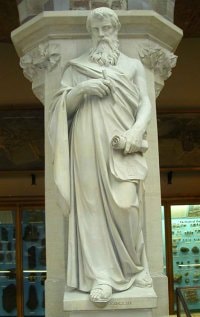Euclid enters history as one of the greatest of all mathematicians and he is often referred to as the father of geometry. The standard geometry most of us learned in school is called Euclidian Geometry.
 |
| Statue of Euclid in Oxford (Public Domain) |
Euclid gathered up all of the knowledge developed in Greek mathematics at that time and created his great work, a book called 'The Elements' (c300 BCE). This treatise is unequaled in the history of science and could safely lay claim to being the most influential non-religious book of all time.
Euclid probably attended Plato's academy in Athens before moving to Alexandria, in Egypt. At this time, the city had a huge library and the ready availability of papyrus made it the center for books, the major reasons why great minds such as
Heron of Alexandria and Euclid based themselves there.
Euclid's Elements
 |
| Euclid's Elements Title Page (Public Domain) |
Euclid's great work consisted of thirteen books covering a vast body of mathematical knowledge, spanning arithmetic, geometry and number theory. The books are organized by subjects, covering every area of mathematics developed by the Greeks:
- Books I - IV, and Book VI: Plane Geometry
- Books XI - XIII: Solid Geometry
- Books V and X: Magnitudes and Ratios
- Books VII - IX: Whole Numbers
The basic structure of the elements begins with Euclid establishing axioms, the starting point from which he developed 465 propositions, progressing from his first established principles to the unknown in a series of steps, a process that he called the 'Synthetic Approach.' He looked at mathematics as a whole, but was concentrated on geometry and that particular discipline formed the basis of his work.
Euclid's Axioms [go to https://explorable.com/euclid]
Euclid's Influence
The reason that Euclid was so influential is that his work is more than just an explanation of geometry or even of mathematics. The way in which he used logic and demanded proof for every theorem shaped the ideas of western philosophers right up until the present day. Great philosopher mathematicians such as Descartes and Newton presented their philosophical works using Euclid's structure and format, moving from simple first principles to complicated concepts. Abraham Lincoln was a fan, and the US Declaration of Independence used Euclid's axiomatic system.
Apart from the Elements, Euclid also wrote works about astronomy, mirrors, optics, perspective and music theory, although many of his works are lost to posterity. Certainly, he can go down in history as one of the greatest mathematicians of all time, and he was certainly one of the giants upon whose shoulders Newton stood.

